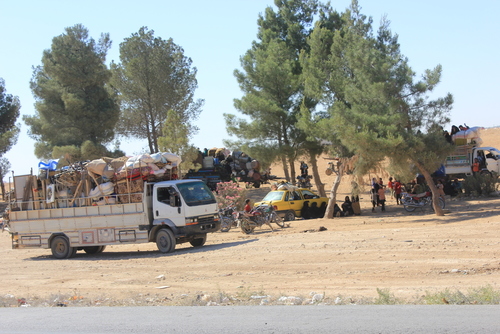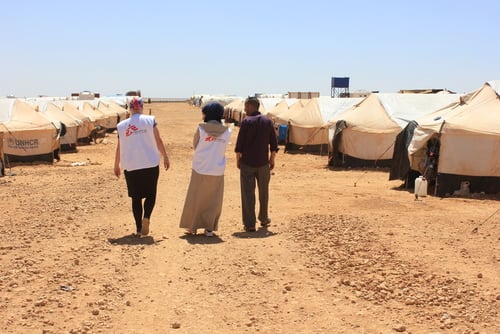Amsterdam/Syria – As fighting intensifies for control of the Syrian city of Raqqa, people must decide whether to remain in the city and surrounding villages under heavy bombardment, or leave the area by crossing active frontlines and minefields, says international medical organisation Médecins Sans Frontières (MSF).
MSF calls on all warring parties and their allies to ensure that civilians in Raqqa are protected, and that those who flee the city are able to reach safer areas without endangering their lives. MSF calls on the countries surrounding Syria to facilitate humanitarian aid to enter Syria, and calls for humanitarian demining activities to be carried out in the north of the country. MSF also urges international aid organisations to step up the provision of humanitarian aid to people fleeing Raqqa.
“Parents have to make an impossible decision,” says MSF emergency coordinator Puk Leenders. “Either they stay in Raqqa, subjecting their children to increased violence and airstrikes, or they take them over the frontline, knowing they will need to cross minefields and may be caught in the crossfire.”
Escaping Raqqa – known as the stronghold of the Islamic State (IS) group – is still fraught with difficulties for those who make the decision to leave. “People are punished if they try to flee, and generally manage to leave only by paying huge bribes,” says Leenders.
“The road to Ain Issa was littered with mines,” says a 65-year-old man from Raqqa. “It took us two months to be able to leave Raqqa, but finally I left with five other families. On the way, I was injured in an airstrike, while two of the children stepped on landmines as we fled in the middle of the night, injuring them both, one of them seriously.”
Many of those leaving Raqqa are heading north in search of safety towards Ain Issa, Manbij, Mahmoudli and Tal Abyad, all within a 120-kilometre radius of the northern Syrian city. Some, however, have headed for ‘the Berm’ – the border area between southern Syria and Jordan, almost 700 kilometres away, where humanitarian assistance is almost non-existent.

Many people have been displaced several times already over the past six years of war, and come originally from towns like Palmyra and Deir Hafer. Often, their health is already poor as a result of barely functioning health services, a lack of humanitarian aid, ongoing war and the closed borders which prevent them from leaving Syria. Already vulnerable, their journey out of Raqqa is taking a heavy toll on their health. This is being exacerbated by poor living conditions once they arrive in a place of relative safety, often in makeshift camps.
Some who have left Raqqa in recent weeks are staying in transit camps; others are camped out under the shade of trees on the outskirts of towns such as Manbij, Tal Abyad and Tabqa. “Driving through these areas, you see tents and people haphazardly scattered all over the place, with the bare minimum for survival,” says Leenders. “Most people that we see are farmers; therefore, most of them either leave with their livelihood, like sheep, and some belongings, or they leave with nothing aside from the clothes they are wearing.”
MSF teams have set up clinics in camps for displaced people and are working in a number of hospitals in the area in and around Raqqa governorate, including Manbij, Tal Abyad and Kobane/Ain Al Arab. Teams are providing emergency medical care to people fleeing Raqqa and elsewhere, as well as vaccinations for children to protect them against preventable diseases and reduce the risk of disease outbreaks. In the past week, MSF teams have vaccinated 1,070 children under the age of five, many of whom have never been vaccinated before.
“Most of the people we see are suffering from acute watery diarrhoea, respiratory infections and psychological complaints due to the loss of loved ones and exposure to traumatic events and the fear of being killed in these events,” says Leenders.
MSF is also setting up medical stabilisation units close to the frontlines to improve the chances of survival for people injured in the fighting, and to refer patients to MSF-supported hospitals where trauma care and surgery is available.



